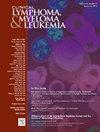Dementia Incidence in Survivors of Multiple Myeloma: A National Case-Control Study Conducted in Korea (The CAREMM-2106 Study)
IF 2.7
4区 医学
Q2 HEMATOLOGY
引用次数: 0
Abstract
Background
Dementia, a growing global health issue, affects older adults and specific groups like long-term cancer survivors. The link between cancer survival and dementia is debated. Multiple myeloma (MM), a common blood cancer in older adults, is often linked with cognitive issues. This study investigated dementia incidence in long-term MM survivors using Korean national data.
Methods
A retrospective case-control study used data from the Korea National Health Insurance Service (KNHIS), covering about 50 million Koreans. Patients diagnosed with MM between 2009 and 2020 formed the case cohort, while the control cohort included matched individuals without MM using propensity-score matching. Analyzing baseline characteristics, comorbidities, and socioeconomic status, the primary outcome was dementia incidence identified via ICD-10 codes. Statistical methods included Kaplan-Meier plots, cause-specific and Fine–Gray subdistribution hazard models, and a 3-year landmark analysis for immortal time bias.
Results
The study included 33,864 patients, with 16,932 in each cohort. The overall cumulative dementia incidence was lower in the MM cohort compared to controls. However, in the first 3 years, MM patients had a higher dementia risk (HR: 1.711, 95% CI, 1.562-1.874) than controls. After 3 years, the risk significantly decreased (HR: 0.625, 95% CI, 0.560-0.696). Age-specific analysis showed a consistent pattern, particularly among MM patients aged 70-79, where dementia risk increased post-3 years.
Conclusion
This study reveals a lower long-term dementia risk in MM survivors compared to non-MM individuals. Further prospective studies are needed to confirm these findings and explore the underlying mechanisms.
多发性骨髓瘤幸存者痴呆症发病率:韩国开展的一项全国病例对照研究(CAREMM-2106 研究)。
背景:痴呆症是一个日益严重的全球性健康问题,影响着老年人和长期癌症幸存者等特殊群体。癌症存活与痴呆之间的联系尚存在争议。多发性骨髓瘤(MM)是老年人常见的血癌,通常与认知问题有关。本研究利用韩国全国数据调查了多发性骨髓瘤长期存活者中痴呆症的发病率:这项回顾性病例对照研究使用了韩国国民健康保险服务(KNHIS)的数据,覆盖了约 5000 万韩国人。2009年至2020年期间确诊为MM的患者组成病例队列,而对照队列包括使用倾向分数匹配法匹配的非MM患者。分析基线特征、合并症和社会经济状况后,主要结果是通过ICD-10编码确定的痴呆症发病率。统计方法包括Kaplan-Meier图、特定病因和Fine-Gray亚分布危险模型,以及针对不朽时间偏差的3年地标分析:研究共纳入 33864 名患者,每个队列中有 16932 人。与对照组相比,MM 组群的总体累积痴呆症发病率较低。然而,在头三年,MM 患者的痴呆风险(HR:1.711,95% CI,1.562-1.874)高于对照组。3年后,风险明显降低(HR:0.625,95% CI,0.560-0.696)。年龄特异性分析显示了一致的模式,尤其是在70-79岁的MM患者中,3年后痴呆风险增加:这项研究显示,与非MM患者相比,MM幸存者的长期痴呆风险较低。需要进一步的前瞻性研究来证实这些发现并探索其背后的机制。
本文章由计算机程序翻译,如有差异,请以英文原文为准。
求助全文
约1分钟内获得全文
求助全文
来源期刊

Clinical Lymphoma, Myeloma & Leukemia
ONCOLOGY-HEMATOLOGY
CiteScore
2.70
自引率
3.70%
发文量
1606
审稿时长
26 days
期刊介绍:
Clinical Lymphoma, Myeloma & Leukemia is a peer-reviewed monthly journal that publishes original articles describing various aspects of clinical and translational research of lymphoma, myeloma and leukemia. Clinical Lymphoma, Myeloma & Leukemia is devoted to articles on detection, diagnosis, prevention, and treatment of lymphoma, myeloma, leukemia and related disorders including macroglobulinemia, amyloidosis, and plasma-cell dyscrasias. The main emphasis is on recent scientific developments in all areas related to lymphoma, myeloma and leukemia. Specific areas of interest include clinical research and mechanistic approaches; drug sensitivity and resistance; gene and antisense therapy; pathology, markers, and prognostic indicators; chemoprevention strategies; multimodality therapy; and integration of various approaches.
 求助内容:
求助内容: 应助结果提醒方式:
应助结果提醒方式:


